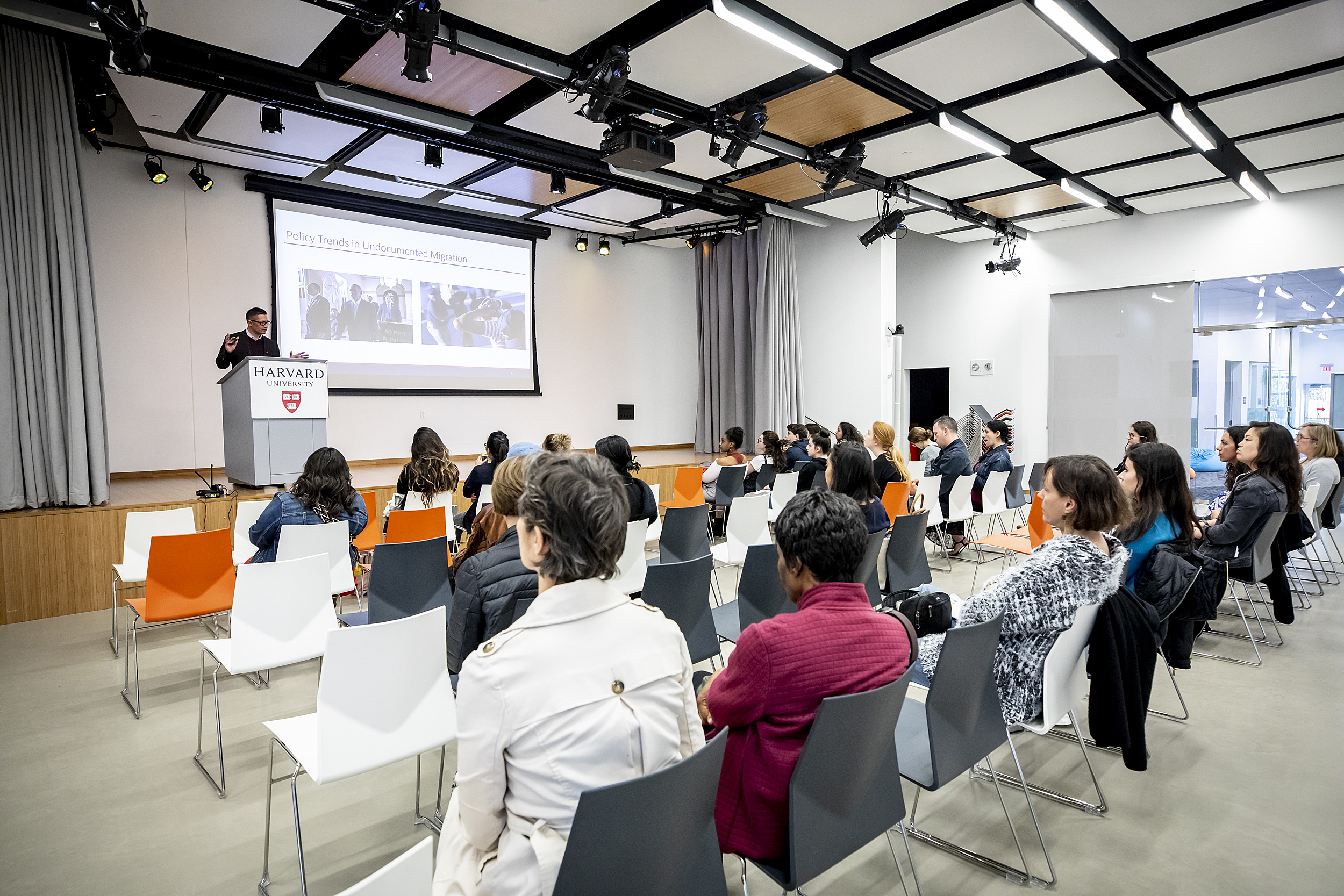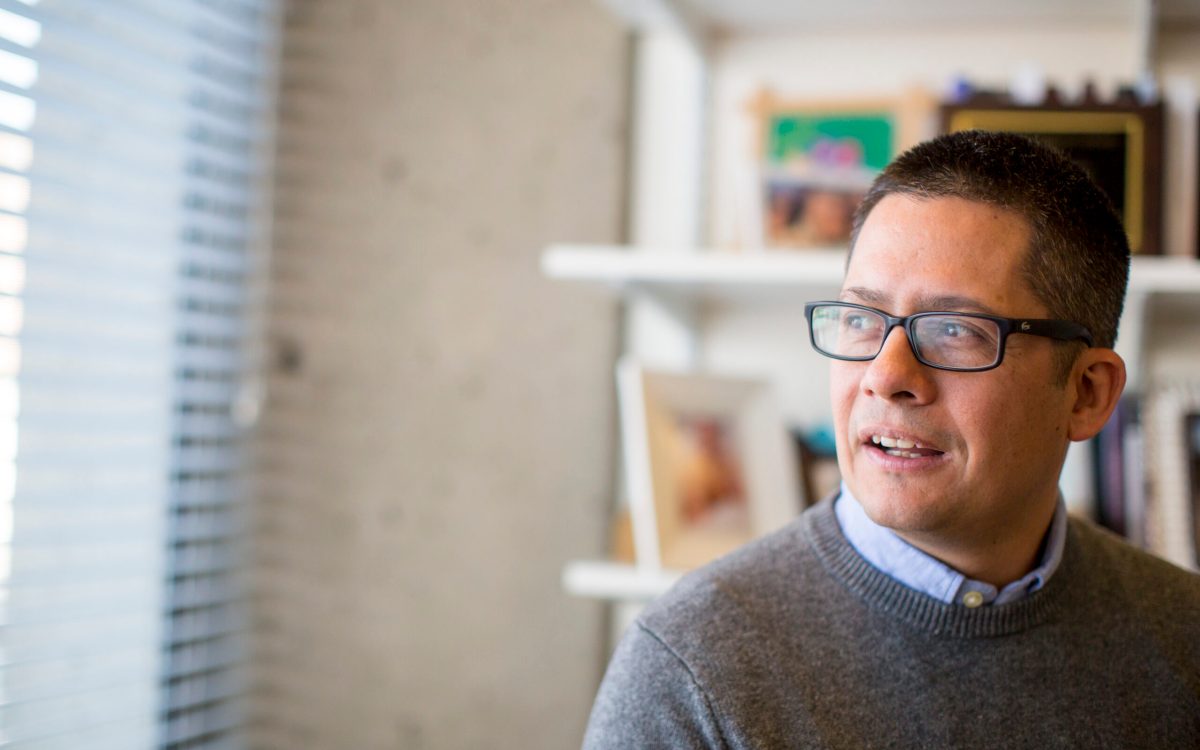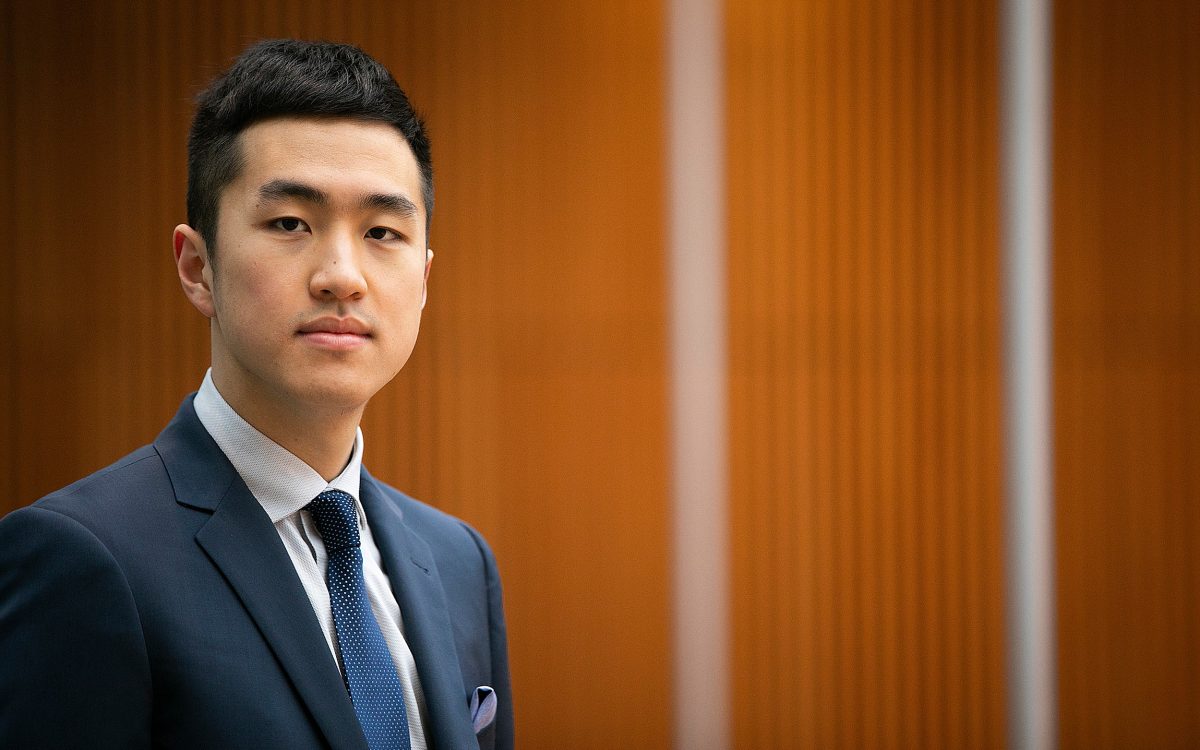
Harvard Graduate School of Education Professor Roberto Gonzales leads a discussion at the Ed Portal about the DACA program.
Photos by Rose Lincoln/Harvard Staff Photographer
Mentors make the difference
High-achieving DACA recipients had help along the way from families and communities
After studying Deferred Action for Childhood Arrival (DACA) recipients for seven years, Harvard Graduate School of Education Professor Roberto Gonzales has seen, through their eyes, all the good and bad of the landmark immigration policy.
Every story is different, and while DACA recipients have been grateful for the program, according to Gonzales, some of them are much more high-achieving than others. A key reason, he said, for the success among some DACA recipients is support — from teachers, mentors, counselors, and others — and last month he found himself encouraging Greater Boston residents to create this support for young immigrants in their own communities.
As part of his research Gonzales led a seven-year study interviewing thousands of undocumented young people who have qualified for deferred action from deportation since DACA took effect.
“I found that the difference was, the high achievers could name three or more mentors,” Gonzales said at a community lecture and discussion at the Harvard Ed Portal in Allston. “Mentors who were there for them at crucial times in their lives.”
He encouraged audience members to think about what they can do, directly or indirectly, to help create a supportive environment for undocumented children and adolescents.
“If immigration reform is not going to happen this year, and people have urgent needs, who will it be to meet those needs?” he said. “We [community members] have the opportunity to pitch in.”
Gonzales is a national expert on undocumented youth and young adults. The paper on DACA-eligible young people is his second long-term study following undocumented residents who were brought to the U.S. as children; previously, he followed 150 undocumented young adults for 12 years. The DACA study consisted of a survey with 2,684 undocumented young people from 42 countries and follow up-interviews with nearly 500 DACA beneficiaries living in six U.S. cities. Study participants were all eligible for protected status under the policy enacted in 2012 by then-President Barack Obama.
Gonzales presented some of the study’s key findings as part of a faculty speaker series at the Ed Portal.
He found that many DACA recipients felt a greater sense of identity and agency, and much less fear and stress, after receiving their DACA status, and quoted one interviewee as saying, “I finally feel like I’m part of the U.S., like I’m no longer living in the shadows.” They eventually began to increase their earnings, obtain credit and driver’s licenses, and feel more like typical Americans, Gonzales said.
For all these reasons, he continued, “DACA is probably the most successful immigrant integration policy reform in the last two to three decades.”
At the same time, the policy has clear limitations. Gonzales illustrated some of these through the story of a young woman called Esperanza whom he met during his previous study. She enrolled in a public university in California in 2002, but struggled to find work after graduation because she was undocumented. By the time she was protected under DACA, she had been working in the service industry for more than a decade and was no longer a competitive candidate for jobs in her field of study.

“The age at which someone receives DACA shapes different trajectories,” Gonzales explained. People like Esperanza, who receive protected status after many years without documentation, find themselves “hitting a new glass ceiling.”
Many of the DACA recipients he interviewed also expressed complicated feelings about living in mixed-status families, Gonzales said. With their protected status, the recipients often find their families dependent on them, and about 70 percent of the young people in his study knew someone who had been detained or deported. They feared for their families — and for themselves, especially with President Trump periodically threatening to revoke their protection.
One participant said having to wait for renewal every two years, with no path to citizenship under DACA, was a “slap-in-the-face reminder that I’m still undocumented.”
Hearing firsthand about the program’s drawbacks and knowing that Trump’s administration has repeatedly threatened to end DACA, Gonzales concluded that those pushing for immigration policy change should not focus only on the federal level.
“Changes to federal policy would be the tide that raises many boats,” Gonzales said. “But change takes time, and young people and their families have to carry out their everyday lives.”
Immigration reform advocates should also focus on the state, county, and municipal levels of government, he said. Policies at these levels, such as allowing undocumented immigrants to qualify for in-state college tuition or driver’s licenses, will affect their daily lives and future prospects regardless of federal policy.
Gonzales appealed to the community to help young immigrants get a head start.
“I strongly believe it will be young people and their families who are central to the success of [immigration reform] efforts,” he said. Community members who engage these families, create safe environments for them, and enable them to access available resources can help them succeed, he explained.
Several audience members, such as Cambridge resident Mary Jo Rendòn, work daily with these young people and their families. Rendòn said it was “painful to see we’re not moving the needle” on immigration reform.
As a counselor for Waltham Public Schools, Rendòn works with the families of young people at risk of dropping out. She agreed with Gonzalez that this type of engagement is crucial for many undocumented adolescents to succeed.
Marisa Lopez, a Boston resident who works for an organization that partners with schools to support teachers, was also in the audience. She said she hears from many teachers that they see the struggles of mixed-status families and don’t know how to help.
As for what she would tell the undocumented young people themselves, Lopez said, “You are not alone, and there are millions of families like yours. There are people studying this, people who care about this. There is hope.”






